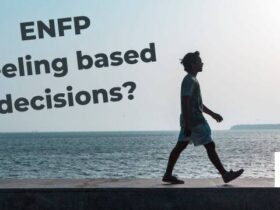ENFP are charming people who believe in living life to the fullest. They can be incredibly generous. They inspire and try their best to make everyone happy around them.
Underneath the happy-go-lucky carefree attitude of ENFP, there can be lots of hidden sadness that they don’t share with everyone.
ENFP cognitive function stack– Ne > Fi > Te> Si > Ni > Fe > Ti > Se
ENFP Relationship Problems – Dealing with ENFP Dark Side
A Relationship with a healthy ENFP can be extremely fulfilling. On the other hand, a relationship with an unhealthy person of any MBTI type is difficult. Here are a few challenges people in relationships with unhealthy ENFP commonly face.
ENFP Love Bombing and Ghosting
ENFP are naturally curious about other people. It feels great when someone shows interest in you and wants to know you at a deeper level. ENFP want to meet people and genuinely connect with them. It is simply who they are.
They can easily make people believe they are special with their warm and enthusiastic nature. But then, they also make everyone and everybody they meet feel special. For some people, when they finally understand this attribute of ENFP, they get disappointed.
The top two functions (Ne-Fi) allow ENFP to know the desires and aspirations of people. ENFP love to be liked by everyone and get attention from people they find interesting. They would frame their words and actions to match your mood. This would make ENFP appear to be an ideal match for you. Perfect on paper and too good to be true.
They cloak their true self and be who you want them to be to find out more about you. They would know your favorite song, movie, color, and how you prefer to live your life within a few minutes.
ENFP want to be liked foremost and are not as honest and straightforward about how they sometimes feel about things. They see the potential in you and want to win you over.
During initial interactions, ENFP observes certain things you do and say and attributes them to your personality. If you once offered them your sandwich, they would make you out to be someone who ‘always’ shares food and is a very generous person. Now that is a huge burden to carry.
It is not done with an ulterior intention. However, by the time the love bombing is over and the person is actually in love with ENFP, it is then the ENFP decides if they really like the person or not.
They will leave if they don’t see you as someone who feels right for them or if the grass suddenly appears greener elsewhere. ENFP might not intentionally ghost, but they can just disappear for a while to evaluate their options. That’s when you wonder why they have suddenly gone cold after lots of giggling and vibing.
ENFP Fantasies Vs. Reality
(Ne) The dominant function shows ENFP possibilities, and (Fi) picks up what feels right to them. It becomes a self-fulfilling prophecy when out of a hundred possibilities, the one with the worst-case scenario is picked up and feels so deep. And, if it feels so deep, how can it be wrong?
These feelings cannot be questioned. And they are internal feelings (Fi). They cannot be easily explained to others.
This translates into ENFP jumping to conclusions based on how they feel rather than what is concrete. How they feel is the most important thing in the world to them, but this approach to life definitely has consequences and creates obvious friction in relationships.
People with (Ne) as dominant and auxiliary functions typically like to create and live in fantasy. But other Ne dom/aux like ENTP/INTP understand the difference between reality and fantasy.
Immature ENFP can’t tell reality apart from their fantasy. They create a fantasy of a person and then get disappointed when the idealized image they create in their mind doesn’t translate into reality. Instead of getting to know the person for who they are, they look at the person as who they could be.
Relationships are unsatisfying for ENFP if they continue to search for a relationship like the ones they saw in romantic comedy movies. It takes a lot of earth-shattering life experiences for unhealthy ENFP to let go of fantasies in favor of self-improvement.
ENFP love language
ENFP want someone to love them and cheer for them the same way as they do. The ENFP would want their partner to open them up as they opened them up.
Believing in equality is good, but it should not be confused with sameness. Loving someone in the same way as they did requires supernatural magic and exceptional mind-reading abilities.
People have different love languages and desires. It is possible to receive and feel love in thousands of ways. When ENFP expects their partner to make them feel the same way they made them feel and do the same things they did for them, the ENFP relationship goes through a rough patch.
The unintended consequence is that the relationship with an unhealthy ENFP feels like a transactional contract. There is an unspoken contract. I cooked lunch for you, so you have to cook the same for me. I watched the movie of your choice, so now you have to watch the movie of my choice.
On the other hand, a balanced relationship with a healthy ENFP is more like a partnership where the strengths of each individual are amplified, and deficiencies are compensated. One partner provides emotional support, while the other can use that support to get physical comfort for both. If one brings the paint and canvas, the other can use it to create a beautiful painting.
ENFP with developed (Fe) is better able to appreciate and understand how the other person shares their love and affection. They recognize that, though, if someone doesn’t show them their love the same way, the intensity is equal and manifests in all the other sweet things they do to show their love towards ENFP.
ENFP Fi Repulsion Switch
Like INFJ doorslam, ENFP has a repulsion switch. ENFP parent function (Fi) makes them very concerned with being authentic to themselves. If they notice anything that doesn’t gel with their value system (Fi), the repulsion switch is activated, and they disappear.
ENFP overanalyze by reading between the lines and observing body language that may or may not mean anything. (Ne) notice a word or action and (Fi) interpret it to cast judgments based on personal values.
It would really help if ENFP simply asked and clarified the matter rather than getting offended. Even if they had analyzed the situation, just asking to clear things up could save a lot of miscommunication.
(Fi) acts as the life compass for ENFP. If it feels good in the moment, they go along that route. They idealize and daydream about how good it feels. However, as soon as the practicality of life sets in, they get disenchanted.
When it stops feeling good, the unhealthy ENFP abandons the people and projects. ENFP (Fi) is committed to itself first and foremost. The (Fe) concerns about how their actions would affect other people or group harmony play no role in decision-making.
ENFP handling criticism
ENFP have (Te) as child function in 3rd position. ENFPs (Te) want to be regarded. They want to be the center of attention. They care what people think about them and always want to be perceived as a good person with high status.
Immature ENFPs interpret advice as criticism. This is because ENFP have introverted thinking (Ti) trickster. If they are criticized using Ti logic, their extroverted thinking child function (Te) becomes turbulent. ENFP believes they are being unnecessarily put down and shamed in front of others to lower their status (Te).
ENFP needs attention and validation. Telling an unhealthy ENFP that there’s a better way to do something, they will think you have disrespected their rationale (Te) and shaken their entire worldview. In their minds, if you think there is a better way, that means you think their way is wrong and that they are stupid.
ENFP wants to be valued and liked by others. It can be very challenging if you want to find the truth, solve the problem and reach a logical conclusion.
ENFP just wants to defend their feelings and status when there is a conflict and wants others to agree with them without actually having to solve it. Unhealthy ENFP does not care about truth or logic, but only how it feels (Fi) and if others see them as good person (Te).
For this reason, you can’t debate with ENFP without it getting ugly. Debating with unhealthy ENFP would be like walking on eggshells. Some ENFPs even try to win a debate when there is none because they feel they have to defend their values (Fi) and status (Te). When they do this, they tend to go on a tantrum, being very emotionally invested in topics they don’t even have full knowledge.
They think they won a debate that did not exist in the first place. Then, they take that as evidence of them being smarter than the other person (Te). All this while the other person might just want to understand the matter and get to the conclusion objectively.
ENFP resist accepting criticism and almost believe they are already perfect because they live according to their personal values. These values are, of course, subjective. Each individual has different personal values. An unhealthy ENFP would struggle to accept that they are wrong and that not everybody shares the same values as them.
Their (Te) will not allow them to admit fault and imperfections within themselves because that would lead to a negative perception of their image among the people and, thereby, a lower status (Te).
Unhealthy ENFP compete with friends for what they don’t have, spend recklessly on items they don’t need, and always have the desire to be seen as an impeccable person with no faults to gain the maximum attention and validation. Any criticism or advice that can be seen as an attack on their perfectly crafted image of themselves would be vehemently opposed.
ENFP Conflict avoidance
(Si) is the 4th function of ENFP. The 4th function usually sees things as black and white. This makes ENFP see the world in terms of good memories/experiences and bad memories/experiences.
It’s either all good or all bad. There is nothing in between. ENFPs (Fi) never want to feel again any situation where they have to face bad memories (Si).
An under-developed (Si) makes ENFP unwilling to reflect on the past and not repeat the same mistakes again. They can fall into a pattern of trying to recreate the same type of relationship and experiences over and over without addressing the issues within.
Addressing the concerns means evoking bad (Si) memories, which won’t feel good (Fi). An immature ENFP can go to extreme lengths to avoid hurtful feelings and thereby resist self-reflection.
Unhealthy ENFPs can really be bad at facing their own mistakes and owning up. For partners of ENFP, it can be frustrating to see someone being unable to come to terms with their own mistakes and being unable to grow and learn from them.
In relationships with unhealthy ENFP, you sometimes have to speak very carefully not to trigger (Si) filled with bad memories. They can be very easily offended when their wish to not dig into the past is not respected, and they go into a fit of anger (Se). Unwilling to compromise or discuss conflict and being extremely conflict-averse is the hallmark of an unhealthy ENFP.
If ENFP tried chicken curry and don’t like it the first time, they won’t eat it again. Even if the circumstances, such as restaurant, chef, or recipe changes. The contraction is that (Ne) makes them open-minded to possibilities, but a single bad experience or being out of comfort (Si) makes them closed-minded in other situations.
Such ENFP loses many friends and potential projects when they see only that 1% of bad experience and refuse to see the rest 99% of good.
ENFP and Fe (Extraverted Feeling) function
ENFP does not value (Fe) based actions and decisions. Fe is their 6th function that undercuts confidence and agency. ENFP are consumed by their own feeling (Fi) and are all about being authentic to their personal values.
When someone does something out of (Fe) to make ENFP happy, they do not recognize, validate or appreciate it. To an unhealthy ENFP, it makes no sense why someone would do something they don’t like to make another person happy.
Immature ENFP can guilt-trip you because they are always in tune with their own emotions. If you are someone who puts other person’s feelings (Fe) above your own (Fi), they can easily make every conversation, going out, etc. be about them and their needs, and not even consider your desires.
They would not return the favor, you were the one who wanted to help them (Fe), but they don’t want to go through the inconvenience (Fi). They will only do things they want to do and at the time of their choice based on what makes them happy. Unhealthy ENFP prioritizes self-ambition (Fi) over the comfort or needs of those around them (Fe).
An unhealthy ENFP is also not very gracious in social settings. They need a great deal of attention (Te) on themselves and not much room for anyone else. Even though they are with (Fi), their personal value system is strangely unreliable and meant to suit their needs.
Such ENFP does not uphold themselves to the standards they may have for others. They would be bothered if you were late but would have no issue expecting you to wait ridiculously long for them.
Unhealthy ENFP expects and demands you to be on the same emotional wavelength as them. If they are sad, you are supposed to feel sad with them. Feel happy when they are happy. Strangely, this is considered as you understanding them.
An unhealthy ENFP would not care if you are in a different emotional state and can even go that far as to criticize you for ruining their mood simply because your emotions are not aligned with theirs. They may call you too optimistic when they are in the depressed phase and expect you to express melancholy and understand how miserable their life is. Still, if they are in a happy mood and someone else is sad, they would expect you to get over it and be happy like they are.
ENFP Ne-Te loop
When ENFP are stressed, they go on a Ne-Te loop. They can be self-indulgent to the extreme, and delayed gratification is very difficult for them. Money and unhealthy habits are issues for this reason.
They don’t believe that the practicalities of life are more important than their desire to be happy right then. They must consciously take a moment and realize the true cause of bubbling feelings before taking action.
ENFP in a Ne-Te loop doesn’t take much responsibility for their own being and tends to think for the short-term than the long-term consequences. They would be very focused on instant gratification and feeding his vices.
Unhealthy ENFP comes across as unreliable and difficult to trust when they stop considering the consequences of their actions and inactions. The ENFP would get very enthusiastic about a new idea for a while but then find a new thing to latch onto in a relatively short amount of time. Getting super into something, like a hobby, spending a ton of time and money on it, and then losing interest entirely. Therefore, investing money and resources in any kind of project with such ENFP is very risky.
If ENFP in a Ne-Te loop doesn’t get the attention and reassurance (Te) they need, they give up and bail on people too easily. Also, they tend to over-commit or gradually stop fulfilling commitments to others as their enthusiasm wanes (Ne). They can be rather flaky when an agreement is made about something, and then they turn around and don’t keep it. Usually, this happens when it seems that a better option has come into play.
On the other hand, an ENFP can also become very stagnant in life. Leading life one day at a time with no ambition or roadmap for future growth. They would dismiss logic in favor of wishful thinking. Immature ENFP can’t provide stability and vision for the future that is required in a partnership or relationship.
A relationship with a healthy ENFP is rewarding. They can be great partners who always support and appreciate their loved ones. Any combination of personality types can work as long as both partners learn from each other and develop trust.
Let us know what you think in the comments below.

Hunaid Germanwala is a digital marketer and content creator at Health Products For You since 2014. He has an MS from Ulm University in Germany. His mind is always buzzing with creative ideas and is eager to explore new perspectives. His motto in life is “Better to Light the Candle than to Curse the Darkness.”













I agree to some of it but not sure it applies to every enfp. I’m an enfp